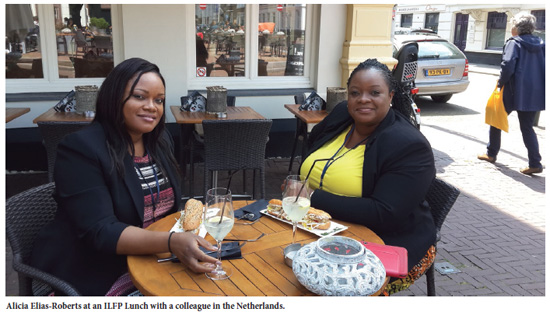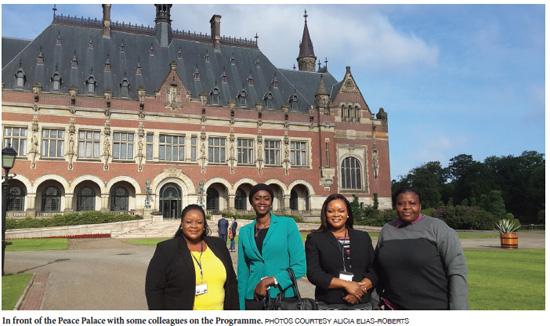|
October 2015

Issue Home >>
|

 Alicia Elias-Roberts, lecturer in the UWI St Augustine Faculty of Law spent the summer in the The Hague, the Netherlands and participated in the United Nations International Law Fellowship Programme (ILFP). She said that the United Nations ILFP was an unforgettable experience that benefitted her in several ways and that she has returned to work with not only new ideas but new connections. Alicia Elias-Roberts, lecturer in the UWI St Augustine Faculty of Law spent the summer in the The Hague, the Netherlands and participated in the United Nations International Law Fellowship Programme (ILFP). She said that the United Nations ILFP was an unforgettable experience that benefitted her in several ways and that she has returned to work with not only new ideas but new connections.
Mrs Elias Roberts is the Deputy Dean in the Faculty of Law and was among a group of 21 participants from various countries who were selected from over 700 applicants to be awarded the 2015 United Nations Fellowship. She said that her participation in the programme has strengthened her research in several developing areas of international law including trade and investment law. The UNILFP is held annually at the Peace Palace and is organized by the Codification Division of the UN Office of Legal Affairs. It is part of the United Nations initiative to provide high quality training by leading practitioners on a broad range of core subjects of international law.
Apart from the new things she learnt while on the programme, she said the other experiences while in the Hague were also very valuable, including visiting new places, sampling different cuisine and making many new friends. The UN had various activities organised for the group during the course of the programme. The organisers planned visits to the International Court of Justice (ICJ), the International Criminal Court (ICC), the International Criminal Tribunal for Former Yugoslavia (ICTY) and other important international organisations and embassies. These visits allowed Mrs. Elias-Roberts to see international law in action and make direct contact with key players in international law. The organisers also planned some leisure trips to different parts of The Netherlands including a boat cruise in Leiden, day trip to Amsterdam and walk around the cities of Delft and Den Haag. Mrs Elias Roberts also joined a group of participants and used the weekends to visit nearby countries, including France and Belgium and established important contacts with the other participants and organisers.
The group of participants was selected from several countries and included ambassadors who represent their countries in the Sixth Committee at the United Nations from Senegal, Saudi Arabia, Brazil and Colombia; lawyers working at the Foreign Affairs Ministries in Liberia, Sierra Leone, Malaysia, Yemen, Sri Lanka, El Salvador; lecturers from Iraq, Afghanistan, Kyrgyzstan; Legal Officer from the African Union Commission; Legal Officer and Legislative Drafter from the OECS in St Lucia, and several other lawyers, ambassadors and academics from various countries.
 The facilitators on the programme were among the most distinguished academics and practitioners in public international law and included Judge A. Cancado-Trindade, Judge of the International Court of Justice, The Hague, Netherlands; Judge Joan Donoghue, Judge of International Court of Justice, The Hague, Netherlands; Sir Michael Wood, Member of the International Law Commission and Senior Fellow of the Lauterpacht Centre for International Law University of Cambridge, UK; Professor Georg Nolte, Member of the International Law Commission, Humboldt University Berlin, Germany; Judge Kevin Riordan, Deputy Chief Judge of the Court Martial and Deputy Judge Advocate General, Former Director-General, Defence Legal Services, New Zealand Defence Force and Lecturer, Victoria University of Wellington Wellington, New Zealand; Sir Nigel Rodley, Chair of the Human Rights Committee University of Essex Colchester, United Kingdom; Professor Pierre Bodeau-Livinec, Université Paris VIII, Vincennes-Saint-Denis Saint-Denis, France; The facilitators on the programme were among the most distinguished academics and practitioners in public international law and included Judge A. Cancado-Trindade, Judge of the International Court of Justice, The Hague, Netherlands; Judge Joan Donoghue, Judge of International Court of Justice, The Hague, Netherlands; Sir Michael Wood, Member of the International Law Commission and Senior Fellow of the Lauterpacht Centre for International Law University of Cambridge, UK; Professor Georg Nolte, Member of the International Law Commission, Humboldt University Berlin, Germany; Judge Kevin Riordan, Deputy Chief Judge of the Court Martial and Deputy Judge Advocate General, Former Director-General, Defence Legal Services, New Zealand Defence Force and Lecturer, Victoria University of Wellington Wellington, New Zealand; Sir Nigel Rodley, Chair of the Human Rights Committee University of Essex Colchester, United Kingdom; Professor Pierre Bodeau-Livinec, Université Paris VIII, Vincennes-Saint-Denis Saint-Denis, France;
Professor Laurence Boisson De Chazournes, Director of the Department of Public International Law and International Organization, University of Geneva, Geneva, Switzerland; and Professor Lucius Caflisch, Member and former Chairman of the International Law Commission, Professor at the Graduate Institute of International and Development Studies Geneva, Switzerland.
The curriculum was very intensive and included seminars on Introduction to international law, treaty law, State responsibility, international peace and security, peaceful settlement of international disputes, diplomatic and consular law, international organizations, international human rights law, international humanitarian law, international criminal law, international environmental law, law of the sea, international trade law and international investment law.
Mrs. Elias-Roberts said that she was very grateful that she was selected to participate in the United Nations Fellowship programme believes that the experience will strengthen her professional development. Mrs. Elias-Roberts has over 13 years’ experience as an academic and her teaching and research focuses on the areas of Public International Law, Oil and Gas Law, International Environmental Law and Administrative Law.
|





